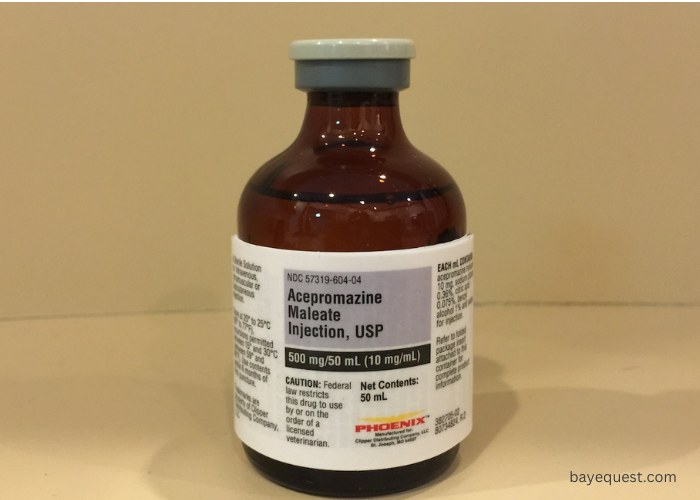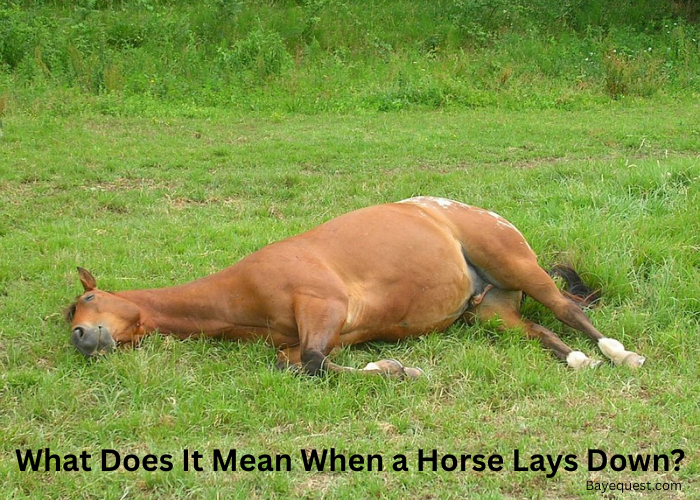Acepromazine, or “Ace,” is a widely used sedative for horses. It helps keep them calm in stressful situations like vet visits and transport.
But how does it work, and when is it the right choice?
In this post, we’ll break down what Ace does, why vets recommend it, and what every horse owner should know before using it.
Whether your horse is nervous or needs to stay still for a procedure, understanding Ace can help.
Let’s take a closer look at this popular sedative.
Ace for Horses: Key Takeaway
Acepromazine, or “Ace,” is a sedative used to calm horses in stressful situations like vet visits or transport. It helps reduce anxiety but does not relieve pain. Always use acepromazine under a vet’s supervision to avoid side effects, especially in stallions. Proper dosage is key for safe and effective use.
What is Acepromazine?
Acepromazine, often called “Ace,” is a drug used to calm horses. It’s not a painkiller, but it helps horses stay relaxed during stressful times, like vet visits or transport.
Ace belongs to a group of drugs called horse tranquilizers. It works by slowing down certain signals in the horse’s brain, which helps reduce anxiety and keeps them still.
Vets often recommend it when a horse needs to stay calm for a short period. It’s a go-to for handling nervous horses or prepping them for surgery.
Related read: What is Benadryl?
How Does Acepromazine Work?
Acepromazine works by affecting the central nervous system in horses. It slows down the communication between the brain and the body, which helps reduce anxiety and creates a calming effect.
When given to a horse, it doesn’t make them sleepy, but it relaxes their muscles and keeps them still.
Ace doesn’t relieve pain, but it helps manage situations where a horse might get too nervous or agitated.
This makes it useful for things like vet visits, grooming, or any time the horse needs to stay calm for a while.
Read also: How Does Osteomax for Horses Work?
Common Uses of Acepromazine in Horses
Acepromazine is commonly used to calm horses in stressful situations. It’s often given before vet visits, transportation, or farrier appointments to help keep the horse relaxed.
Vets may also use it as a pre-sedative before surgery to make the horse easier to handle. Some horses get nervous or excitable in certain environments, and Ace helps reduce that anxiety.
It’s also useful for managing horses that might injure themselves or others when they’re too worked up.
Overally, Ace helps keep things safer and calmer when a horse is feeling stressed.
Read also: What is DMSO Used for in Horses?
Dosage and Administration of Acepromazine Maleate
The dosage of acepromazine maleate varies depending on the horse’s size, weight, and the situation.
It’s usually available in two forms: injectable and oral tablets. For most horses, vets recommend starting with a low dose to see how the horse responds.
Injectable acepromazine can be given either intravenously (IV) or intramuscularly (IM), with IV acting faster, while the oral form takes a bit longer to kick in.
Vets determine the right amount based on the horse’s specific needs, so you need to follow their instructions.
Overuse or incorrect dosing can cause problems, like low blood pressure or too much sedation.
Potential Side Effects and Risks of Ace for Horses
Acepromazine has some potential side effects and risks that you should be aware of.
Common side effects include drowsiness, low blood pressure, and muscle weakness. Some horses may also appear a bit wobbly or have trouble staying steady on their feet after taking it.
In rare cases, Ace can cause allergic reactions like hives or swelling.
One serious risk to watch out for is in stallions. Acepromazine can cause penile prolapse, a condition where the penis doesn’t retract properly.
Also, avoid giving Ace to horses with certain medical conditions, like those prone to seizures or with heart issues. Always check with your vet to make sure it’s safe for your horse.
How Long Does Acepromazine Last?
The effects of acepromazine usually last between 4 to 6 hours. However, this can vary.
Some horses may stay calm for a shorter time, while others may remain sedated longer.
The duration depends on the horse’s size, age, health, metabolism, and dosage.
When given intravenously (IV), acepromazine works in 15 to 30 minutes.
The oral and intramuscular (IM) forms take longer, around 30 to 60 minutes. Its calming effects wear off gradually.
Even after the visible effects fade, acepromazine can stay in the horse’s system for up to 24 hours.
During this time, the horse may still feel mildly sedated and less alert.
Always follow your vet’s advice for the right timing and dosage. This helps ensure acepromazine is used safely and effectively.
Side Effects of Acepromazine
Acepromazine can cause several side effects in horses.
The most common ones include drowsiness, low blood pressure, and muscle weakness. Some horses may appear wobbly or unsteady after taking it.
In rare cases, acepromazine can cause allergic reactions such as swelling or hives.
A serious risk, especially in stallions, is penile prolapse (paraphimosis), which can lead to permanent damage if not treated.
Ace can also reduce a horse’s ability to regulate body temperature, making them more sensitive to hot or cold weather.
It may lower the seizure threshold, so it should not be used in horses with a history of seizures.
If a horse shows signs of overdose, such as extreme lethargy, breathing problems, or collapse, seek veterinary help immediately.
When Not to Use Acepromazine
There are certain situations where acepromazine should not be used. Horses with a history of seizures are at higher risk, as Ace can lower the seizure threshold.
It’s also not recommended for horses with heart or liver problems because it can affect blood pressure and heart function.
Stallions should be given Ace with caution due to the risk of penile prolapse, which can lead to permanent damage.
Ace should also be avoided if the horse needs to be fully alert or perform tasks that require coordination, as it may cause muscle weakness or a lack of control.
Where to Buy Acepromazine Drug
Acepromazine is a prescription drug, so it’s not available over the counter. To purchase it, you’ll need to get a prescription from your veterinarian.
Once you have the prescription, you can buy it through various sources, including vet clinics, online veterinary pharmacies, or specialized equine supply stores.
Ensure you’re buying from a trusted source, as quality and safety are key.
Always follow your vet’s guidance on where to purchase and how to use the drug safely for your horse.
Alternatives to Acepromazine
There are several alternatives to acepromazine for calming horses, depending on the situation and the horse’s needs.
Xylazine and detomidine are two common sedatives used in place of Ace. These drugs provide stronger sedation and some pain relief, making them more suitable for medical procedures or when a deeper level of calm is required.
For mild anxiety, natural calming supplements like magnesium or valerian root are sometimes used. In some cases, behavioral training or environmental adjustments can help manage stress without the need for drugs.
Always consult with a vet to find the best option for your horse.
Conclusion
Acepromazine is a helpful tool for managing nervous or stressed horses. It calms them in tough situations, like vet visits or transportation, making things safer for everyone.
However, it should be used properly and only under a vet’s guidance. There are some risks, especially for stallions and horses with certain health conditions.
Always talk to your vet before using Ace, and be sure to follow the right dosage.
With careful use, acepromazine can be a valuable part of your horse care routine, helping to keep things calm and controlled when needed.








